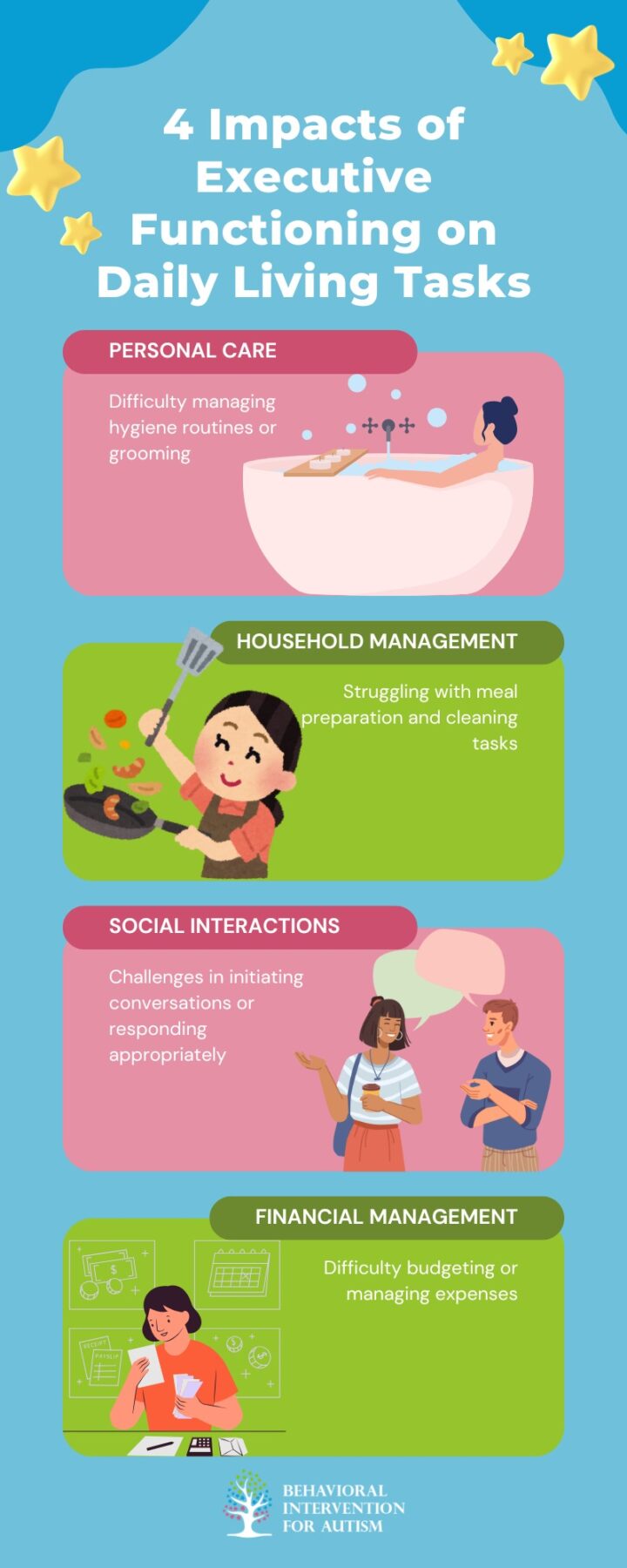
Table of Contents
Autism Spectrum Disorder (ASD) is a complex developmental condition characterized by challenges in social interaction, repetitive behaviors, and communication. The symptoms and severity of autism can vary widely in individuals, which is why it is described as a “spectrum.” It’s crucial for parents, caregivers, and individuals affected by ASD to recognize the unique traits and needs associated with this condition.
The following table outlines some common characteristics associated with ASD:
Characteristic | Description |
Social Interaction | Difficulty in understanding social cues and responding appropriately |
Communication | Challenges in verbal and non-verbal communication, often leading to misunderstandings |
Repetitive Behaviors | Engaging in repetitive movements or speech patterns, which may provide comfort or a sense of predictability |
Sensory Sensitivities | Over or under-reacting to sensory stimuli such as sounds, lights, or textures |
What is Executive Functioning?
Executive functioning refers to a set of cognitive processes that enable individuals to plan, focus attention, remember instructions, and manage multiple tasks successfully. This collection of mental skills is essential for goal-oriented behavior and helps maintain self-control.
Individuals with autism may experience difficulties with executive functioning, impacting their ability to perform daily tasks effectively. The following table highlights key components of executive functioning:
Executive Functioning Component | Description |
Planning | The ability to organize tasks and set goals |
Working Memory | The capacity to hold and manipulate information temporarily |
Task Initiation | The skill to begin an activity or task independently |
Cognitive Flexibility | The ability to adapt to new situations and switch between tasks |
Understanding the role of executive functioning in autistic adults’ daily tasks is crucial for identifying potential challenges and implementing supportive strategies.
Executive Functioning Challenges in Autism
Understanding executive functioning challenges in individuals with autism is essential for supporting their daily living tasks. These challenges can significantly impact their ability to navigate everyday situations effectively.
4 Impacts of Executive Functioning on Daily Living Tasks
The role of executive functioning in autistic adults’ daily tasks is crucial. Difficulties with planning, organizing, and monitoring tasks can lead to various obstacles in daily activities such as personal care, household responsibilities, and social interactions.

6 Common Areas of Difficulty
Executive functioning challenges can manifest in several key areas, making daily tasks more complex. Recognizing these areas helps caregivers provide targeted support.
Area of Difficulty | Description |
Planning | Difficulty creating a step-by-step approach to tasks |
Organizing | Struggles with keeping track of belongings or schedules |
Time Management | Challenges in estimating how long tasks will take |
Flexibility | Difficulty adjusting plans or adapting to changes |
Task Initiation | Struggles to start tasks without prompts |
Problem-Solving | Difficulty generating solutions to unexpected issues |
These executive functioning challenges can hinder independence and make daily living tasks more demanding for autistic individuals. Addressing these challenges through tailored strategies can provide better support in managing everyday activities.
3 Strategies to Support Executive Functioning
Supporting executive functioning can significantly enhance the daily living skills of autistic adults. Implementing effective strategies is essential for improving their ability to manage tasks independently.
Visual Schedules and Prompting
Visual schedules provide a structured way to present tasks and activities. Using pictures, icons, or written instructions, these schedules help individuals to understand the sequence of tasks. This method reduces anxiety and confusion, allowing for smoother transitions between activities.
Schedule Type | Description | Benefits |
Picture Schedule | Uses images to depict tasks | Easily understandable, promotes independence |
Written Schedule | Lists tasks in written format | Encourages literacy skills, good for advanced readers |
Digital Schedule | Uses apps or devices to display tasks | Accessible, can include reminders and alerts |
Prompting refers to providing cues or hints to initiate or complete tasks. Types of prompts include verbal prompts, visual cues, or physical guidance. These prompts can support individuals in remembering steps and maintaining focus on tasks.
Break Down Tasks into Smaller Steps
Breaking tasks into smaller, manageable steps can make complex activities less overwhelming. Each step should be clear and actionable, allowing the individual to focus on one part of the task at a time. This approach is particularly helpful for activities such as cooking, cleaning, or completing homework assignments.
Task Example | Original Task | Smaller Steps |
Cooking a Meal | Prepare dinner | 1. Choose recipe 2. Gather ingredients 3. Preheat oven 4. Prepare items 5. Cook according to recipe 6. Set table |
Cleaning Room | Clean the bedroom | 1. Pick up clothes 2. Dust surfaces 3. Vacuum the floor 4. Organize desk 5. Make the bed |
Environmental Modifications
Environmental modifications involve altering the physical space to promote better focus and organization. Adjustments might include organizing personal spaces, minimizing distractions, or creating designated areas for specific tasks. A well-structured environment supports independence and encourages successful task completion.
Modification Type | Example | Benefits |
Decluttering | Reducing unnecessary items | Minimizes distractions, creates a calming atmosphere |
Designated Spaces | Specific areas for activities | Promotes organization, aids in task separation |
Visual Organization | Color-coded systems or labels | Enhances understanding and recall, makes finding items easier |
Implementing these strategies supports the role of executive functioning in autistic adults’ daily tasks. These approaches can help improve their ability to plan, initiate, and complete various activities independently.
Empowering Autistic Adults
Supporting autistic adults means fostering independence, enhancing daily living skills, and strengthening executive functioning to navigate everyday tasks effectively. Building confidence through small achievements, learning self-advocacy, and establishing self-care routines are key to promoting well-being and autonomy.
By emphasizing these skills, autistic adults can better manage their needs in various settings, from school to work. Encouraging structured routines, clear communication, and gradual skill-building fosters long-term success and improves their overall quality of life.
Take the Next Step Toward Meaningful Progress
Executive functioning challenges can make daily tasks overwhelming for autistic adults, but the right support can foster independence and confidence. We provide tailored interventions that break down complex skills into manageable steps, empowering individuals to navigate their world with ease. Our team at Behavioral Intervention for Autism offers compassionate, evidence-based ABA therapy services designed to strengthen executive functioning. With our personalized approach, we help individuals build essential life skills for lasting success. Reach out today to explore how we can support your journey with expert ABA therapy in Florida—let’s work together to create meaningful progress!
Sources:
- 9 Common Obsessions of Children With Autism You Should Know - February 25, 2025
- What is Neurodiversity? A Guide to Embracing Differences - February 25, 2025
- Understanding Hyperfocus in Autism: What It Means and Why It Happens - February 25, 2025

